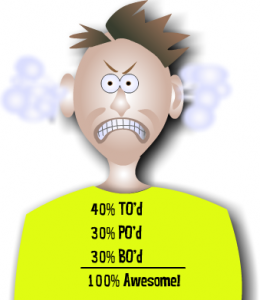 Post #157 from Dr. Crankenfuss, The World’s Awesomest Raving and Rapping blogger–
Post #157 from Dr. Crankenfuss, The World’s Awesomest Raving and Rapping blogger–
Okay, our English class in in the middle of reading HAMLET. It’s by William Shakespeare, of course, and our teacher says HAMLET is generally considered to be the greatest work of literature in the English language.
Say wha-a-a-a-!!
Shouldn’t the greatest work of literature at least be understandable? And I’m not talking about for kids like me; I’m talking about for adults. I’ll show you what I’m talking about in a minute. Get your brain ready for some torture. In the meantime, I’ve written this little story for you. It will look kind of foreign, but do your best to figure out its main storyline.
Here it is. Don’t give up. Give it a couple of minutes.
Un elefante es un animal interesante y differente. Es fabuloso, pero LOCO. Un elefante conduce su carro como un maníaco, rápido y furioso. Pero este elefante es estúpido. Sufre un accidente, un accidente terrible. El carro es destruido, pero el elefante está bien. ¡Qué afortunado es este elefante!
Yes, I know it’s in a foreign language. It’s Spanish! But I bet you can still understand most of it even though IT’S NOT IN ENGLISH! If I tell you that the word “pero” means “but,” you might get almost every bit of it.
Here’s the exact translation:
An elephant is an interesting and different animal. It is fabulous, but CRAZY. An elephant is driving his car like a maniac, fast and furious. But this elephant is stupid. He suffers an accident, a terrible accident. The car is destroyed, but the elephant is okay. How fortunate is this elephant!
How’d you do? Pretty well, I bet, and remember you’re reading it in SPANISH.
Now try this passage from HAMLET. (It’s much longer, but hey it’s in ENGLISH – right? — so it shouldn’t be that bad. I’ll give you the setup: Hamlet has been kind of flirting with Ophelia, so here’s his advice to her. See how much you can figure out about what he’s saying. And please don’t give up. Remember, it IS in English!
For nature, crescent, does not grow alone
In thews and bulk, but, as this temple waxes,
The inward service of the mind and soul
Grows wide withal. Perhaps he loves you now,
And now no soil nor cautel doth besmirch
The virtue of his will, but you must fear.
His greatness weighed, his will is not his own,
For he himself is subject to his birth.
He may not, as unvalued persons do,
Carve for himself, for on his choice depends
The safety and health of this whole state.
And therefore must his choice be circumscribed
Unto the voice and yielding of that body
Whereof he is the head…
(If this isn’t enough for you, Laertes explains himself further, 20 more lines worth, with quite easily understood language like this:)
…Then if he says he loves you,
It fits your wisdom so far to believe it
As he in his particular act and place
May give his saying deed, which is no further
Than the main voice of Denmark goes withal.
Then weigh what loss your honor may sustain
If with too credent ear you list his songs,
Or lose your heart, or your chaste treasure open
To his unmastered importunity.
Fear it, Ophelia. Fear it, my dear sister,
And keep you in the rear of your affection,
Out of the shot and danger of desire.
The chariest maid is prodigal enough
If she unmask her beauty to the moon.
Virtue itself ’scapes not calumnious strokes.
The canker galls the infants of the spring
Too oft before their buttons be disclosed.
And in the morn and liquid dew of youth,
Contagious blastments are most imminent.
Be wary, then. Best safety lies in fear.
Youth to itself rebels, though none else near.
So???? How much of that did you get? I’ll give you the essential summary:
MAYBE HE LOVES YOU NOW, BUT BE CAREFUL, OPHELIA.
That’s about the sum of it. And yes, our teacher told us that “his will is not his own” means he’s going to be the King of Denmark so whatever decision he makes will affect the whole country, and a bunch of other stuff, but I didn’t get any of her extra explanations from reading it, only from her telling us. And even now, I can’t really explain like 80 or 90% of it.
Honestly, how much did YOU get? Hey, I bet you didn’t even read it all!! Too hard, wasn’t it? Which automatically makes it boring after a minute or two (for most of us anyway).
SO WHAT I’VE PROVEN TODAY IS THAT IT’S EASIER TO READ IN A FOREIGN LANGUAGE THAN IT IS TO READ SOME OF THE STUFF THEY’RE GIVING MIDDLE SCHOOLERS NOWADAYS.
HELP!!
From Your Dude with the ‘Tude,
To whom disaster does befall
When he hears Shakespeare’s call,
Dr. Crankenfuss